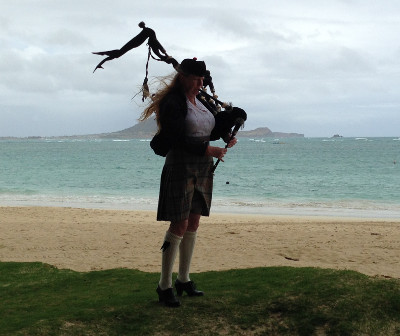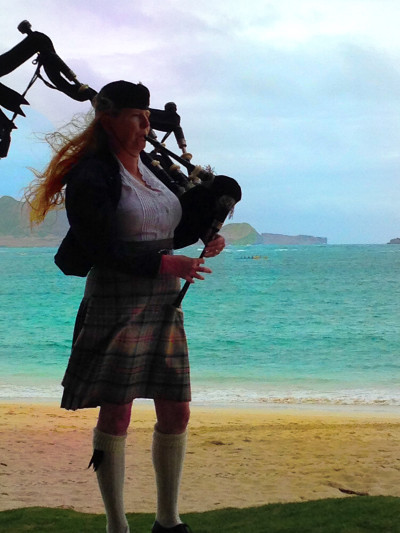

Need guidance on when and how the bagpipes can be used at a wedding?
Consider, in planning your wedding,
Do you want a piper at the rehearsal dinner or at the reception? Is piping during the wedding a surprise event? Is there a family connection to Scottish heritage that you are trying to present during the wedding?
Here are some good ways to include bagpipes into your wedding celebration -
Couples typically have a bagpiper play at one or more of the following places -
Bagpipes are loud (110 decibels at 10 ft!), so keep that in mind when deciding where your guests may enjoy listening to the piper. Performing in large open spaces, or just outside the entrance to a room, is often better than playing in a small room with a low-ceiling. You may want the piper to play at the back of the church so the music adds to the ceremony without taking attention away from the wedding party.
Pipers can play just about anywhere. Here are some suggestions -
It is best to have one location for a piper to stand to play for a beach or outdoor wedding. Please do not ask a piper to play while hiking over sand dunes. Besides sand in the ghillies, the piper can be injured by the blow stick. A solid flat surface is best for outdoor playing and marching.

Pipe Major Greeley on Oahu Beach
There is a vast repertoire of appropriate pipe music for wedding services. Hymns and Marches are the most traditional type of music to play for a processional, and 6/8 Marches, Reels, or Jigs, with their upbeat swing, make excellent recessional pieces.
Here is a sample list of tunes played at weddings. You can find these by an internet search of each title:
Maire’s WeddingWe have a wide range of music available, and we can work with the wedding planner to select the right music for your wedding.
Rates depend on the number of performers needed, amount of time of performance, whether the performer(s) need to learn new music, distance to event, and type of event (special consideration for military associated events). Please call to discuss the rate. Payment is by Paypal, cash or check, delivered to the piper before the event begins. A deposit of half the fee holds your reservation.
Email: CelticKula@gmail.com
Message Phone: 808 779-5940
|
The playing of Bagpipes is traditional at memorials. The sound of pipes is often heard at times when we honor those whom we have lost – at funerals, on national days of remembrance such as Memorial Day and Pearl Harbor Day, at celebrations of life, at wakes, and at ceremonies for the scattering of remains. Need guidance on when and how the bagpipes can be used at a memorial service? Consider in planning your memorial,
|

Celtic Kula at the War Memorial on Waikiki Beach |
Here are some good ways to include the music of bagpipes into your memorial service:
A bagpiper usually plays at one or more of the following places -
Bagpipes are loud (110 decibels at 10 ft!), so keep that in mind when deciding where your participants would be listening to the piper. Performing in large open spaces, or just outside the entrance to a room, is often better than playing in a small room with a low-ceiling. You may want the piper to play at the back of the room so the music adds to the memorial without taking attention away from those conducting the memorial.

Pipers can play just about anywhere. Here are some suggestions -
Before the Service – A bagpiper can be used very effectively as mourners arrive to create an air of solemnity and reflection, particularly if mourners are expected to arrive within a fairly short period of time (for instance, 15-20 minutes before a service begins). Additionally, the piper can meet a hearse, if appropriate and start the processional of the service and lead the pall-bearers and casket either to the front door of the service or in through the congregants.
During the Service – Bagpipe music can be used throughout the service as the family desires.
At the end of the Service – If a casket is present, the piper can again lead the pall-bearers and casket back down the aisle and out the door of the church to the waiting hearse, and continue playing as the casket is being loaded. If there is no casket, or if the family desires this instead, the piper can play near the door as the mourners leave. Additionally, a piper can stand nearby the entrance of a reception if it follows the service.
Before the Service Begins – The amount of time that the piper plays before a service usually depends on whether the service takes place at a chapel or mausoleum, or just at the grave site or location of ashes being scattered. The piper will generally play for a longer period (usually for 15-20 minutes) before the start of a service at a cemetery chapel or mausoleum. At a grave site service or location of ashes being scattered (which often follows a church or chapel service), the playing time before the service begins is much shorter (usually about 5-6 minutes) because the mourners generally arrive together.
At the Grave site – The piper will meet the hearse and start playing a processional air as the pall-bearers take the casket from the hearse. The piper can then lead the procession to the grave site.
For ashes scattered at sea – The piper usually plays from the shore as the vessel carrying the remains goes out to the location where the remains are scattered. The piper can continue to play until the vessel returns if the scattering location is close to shore. Alternatively, if the vessel is large enough, the piper can travel and play on the vessel at the location where the remains are scattered, playing at the time of scattering and afterwards as the organizers wish.
During the Service – One or more selections, such as “Amazing Grace”, may be played at an appropriate time during the service, usually while flowers are being placed on the casket and/or it is being lowered.
After the Service – When the service concludes, the piper will again play as the mourners leave the chapel, mausoleum, grave site, or scattering site.
It is best to have one location for a piper to stand to play for a beach or outdoor service. Hiking over sand dunes is best not attempted. A solid flat surface is best for outdoor playing and marching.

Pipe Major Greeley at Ashes Scattering on Oahu Beach
There is a vast repertoire of appropriate pipe music for memorial services and remembrance ceremonies.. Slow Airs and Laments are particularly suited for funeral and memorial services, as well as piobaireachd, considered the classical music of bagpipes.
|
Here is a sample list of tunes often played at memorials: |
 |
For members of the military, Taps may also be played.
We have a wide range of music available, and we can work with the memorial planner to select the right music to honor the deceased.
Rates depend on the number of performers needed, amount of time of performance, whether the performer(s) need to learn new music, distance to event, and type of event. Payment is by Paypal, cash or check, delivered to the piper before the service begins. A deposit of half the fee holds your reservation. Please call us for military memorials for special rates.
Email: CelticKula@gmail.com
Message Phone: 808 779-5940
|
Need guidance on when and how the bagpipes can be used at your event? Bagpipers can play at private parties for corporations, at homes, at conventions, pub crawls, outdoor concerts, and other types of celebrations. We have played pipes at birthdays, retirements, graduations, corporate parties, Robbie Burns Night celebrations, St. Patrick’s Day celebrations, charity walks, and races. Anytime people gather and celebrate is a great time to add the music of the pipes. The number of pipers used depends on the type of event. Usually one piper is all that is needed for a small private party, while a group of pipers may be better for a large event like a convention. Consider, in planning your event,
|

Theresa at a Pub Crawl |
Do you want pipe music to open or close your event? Do you want piping to kick off or end an activity? Do you want the piper to lead a group to move from one location to another, or to get everyone’s attention before the opening speaker?
Here are some good ways to include bagpipes into your event -

Celtic Kula and guest at St. Andrews Church
Bagpipes are great in large or outdoor event spaces. For an event in a small room, have the piper play at the entrance or just outside the room. Bagpipes are loud (110 decibels at 10 ft!), so keep that in mind when deciding where your guests may enjoy listening to the piper. You may want the piper to play at the back of the event room so the music adds to the gathering without taking attention away; letting guests visit with each other with beautiful Scottish Highland music in the background.

Melanie and Kim Leading the 2017 Women's March
Pipers can play just about anywhere. Here are some suggestions -
As part of a convention or ceremony
Before the Event – Bagpipers can play as guests arrive to create an air of joy and happiness, particularly if guests are expected to arrive within a fairly short period of time (for instance, 15-20 minutes before a event begins). Additionally, pipers can pipe in the presenters, or start off the procession of presenters to the stage. A piper can also stand at the back of the room and pipe the presenters to the stage for a smaller event.
During the Event – Bagpipe music can add variety to your program, particularly if music is part of your event. We can work with you to make sure bagpipes are used at appropriate times during any ceremony. The selection of music and when to play will depend on the nature of your event.
At the end of the Event – Pipers can play at the end of your event to provide an uplifting end for the participants. Pipers can play for the exit of the presenters or at a convention closing ceremony.
At a Beach or Other Outdoor Location
Bagpipe music is wonderful on the beach or at the park. It is best to have one location for bagpipers to stand to play in an outdoor setting. Hiking over sand dunes, though, is not recommended. Too much sand in the ghillie brogues! A solid flat surface is best for outdoor playing and marching.

Pipe Major Greeley playing for "Run For The Wall" at the Lincoln Memorial
There is a vast repertoire of appropriate pipe music for conventions and celebrations. Marches are excellent for kicking off a program, and retreats can end a program. We have a wide repertoire of uplifting military, marching, holiday and dance tunes to chose from to compliment the tone and purpose of your event. Please see the sample tune list of the many tunes we can play. We can also learn any tune that can be played on the pipes if you have something special in mind, and if there is enough lead time before the event.
Rates depend on the number of performers needed, amount of time of performance, whether the performer(s) need to learn new music, distance to event, and type of event (special consideration for military associated events). Payment is by Paypal, cash or check, delivered to the piper(s) before the event begins. A deposit of half the fee holds your reservation. Call us for special rates for military events.
Email: CelticKula@gmail.com
Message Phone: 808 779-5940